THE TRIAL OF THE CHICAGO 7 (2020)
The story of seven people on trial stemming from various charges surrounding the uprising at the 1968 Democratic National Convention in Chicago, Illinois.
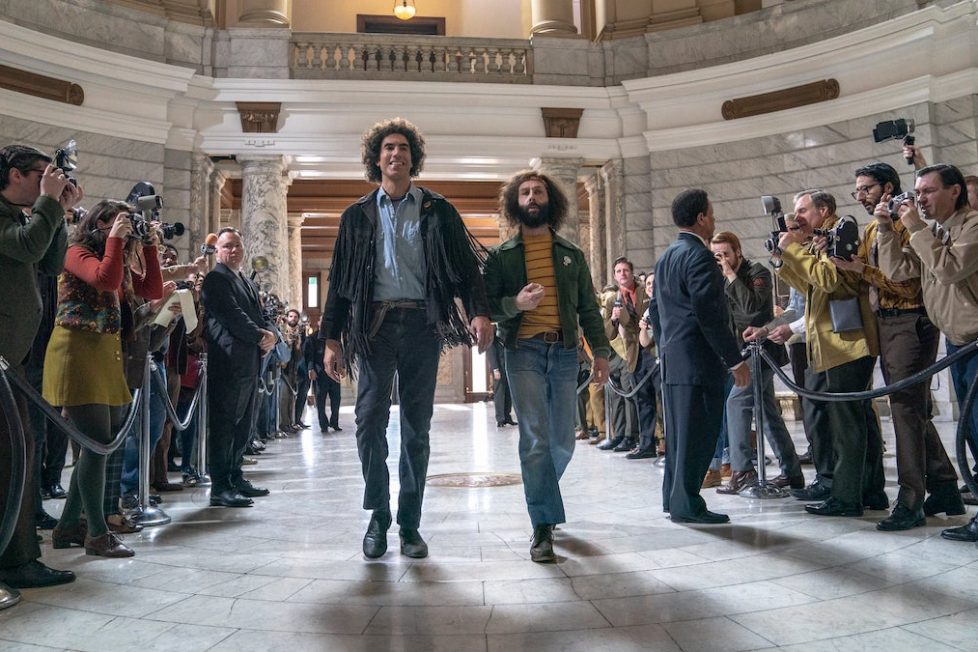
The story of seven people on trial stemming from various charges surrounding the uprising at the 1968 Democratic National Convention in Chicago, Illinois.


Aaron Sorkin delivers in The Trial of the Chicago 7 exactly what one would expect from the man who wrote The West Wing (1999-2006), The Social Network (2010), and Steve Jobs (2015), before directing Molly’s Game (2017). This is a flashy film; a work of slick storytelling (too slick for its own good), brimming with self-confidence and utterly watchable from beginning to end… and yet ultimately rather empty.
It’s a bit like one of those hyperrealistic oil paintings that strive to look like a photograph: the technique’s entrancing but after a while you come to realise you’re looking at a lifeless and superficial representation of something, without any real soul of its own.
The Trial of the Chicago 7 begins with a montage remarkably similar to that which opens Spike Lee’s Da 5 Bloods (2020): Lyndon B. Johnson announcing an increase in American troops committed to Vietnam, Martin Luther King condemning the war, and so on…. although here (unlike in Lee’s film) it’s intercut with scenes introducing some of the lead characters as they pursue their various politically-charged agendas. They include Tom Hayden (Eddie Redmayne), leader of Students for a Democratic Society; Bobby Seale (Yahya Abdul-Mateen II), a leader of the more notorious Black Panthers; and David Dellinger (John Carroll Lynch), a middle-aged pacifist.
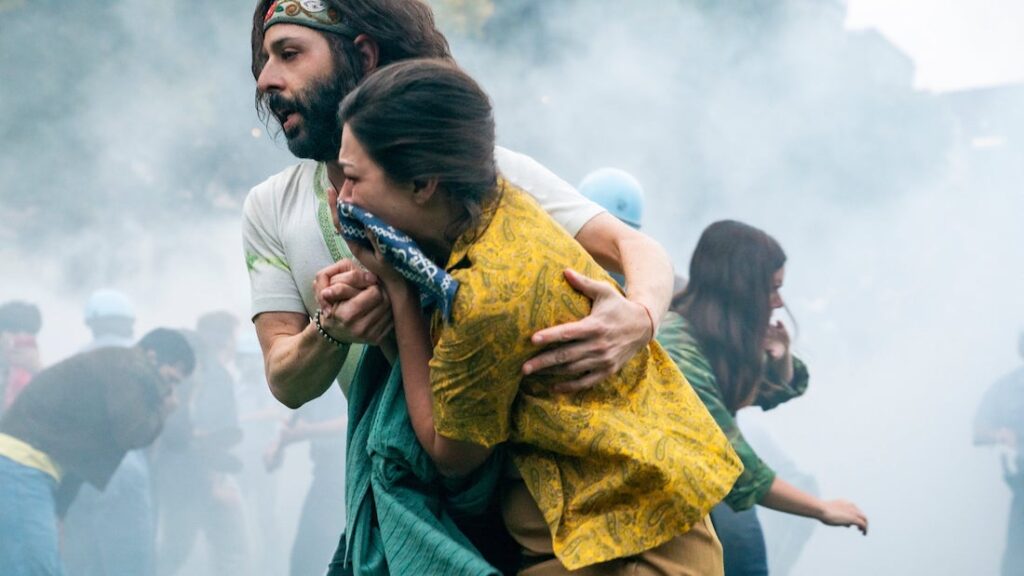
Also making their first appearances in this sequence are Jerry Rubin (Jeremy Strong) and Abbie Hoffman (Sacha Baron Cohen), leading lights of the Youth International Party (the “Yippies”), a radical group which makes Hayden’s student organisation seem positively conservative. Indeed, Hoffman’s clashes with Hayden will be a major thread later on.
Altogether, it’s a bravura seven-minute sequence establishing the context and mood, leading up to the Democratic National Convention in Chicago in August 1968. Here, this motley group of antiwar activists will come together—and come into conflict with the Chicago police, resulting in their arrest and trial on charges including conspiracy and incitement to riot. The bulk of the film follows their trial, generously interspersed with flashbacks to events in Chicago. Originally there were actually eight defendants, but for reasons startlingly explained in the movie, Seale’s case was eventually separated from the others’.
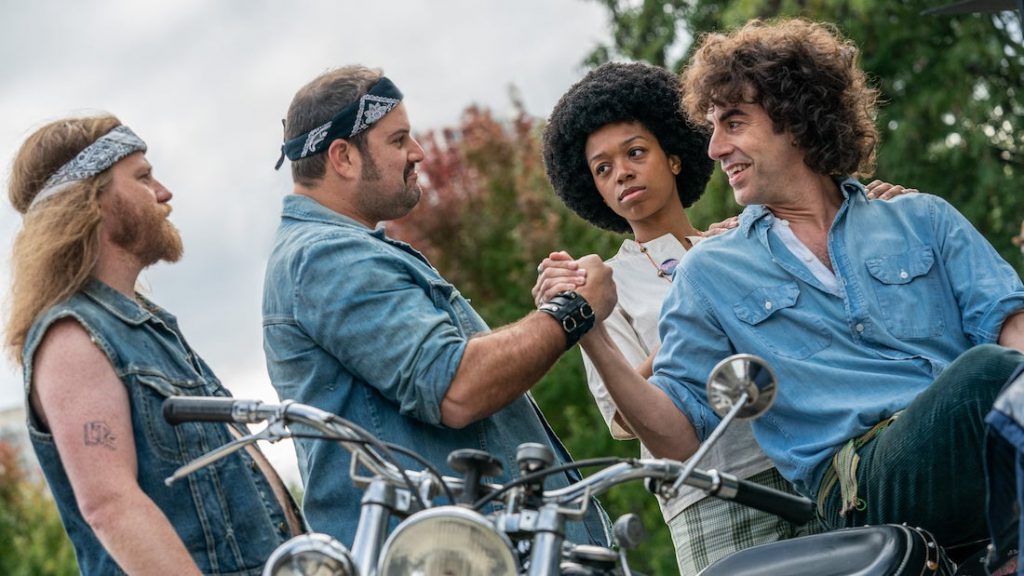
The flashback structure adds a sense of unpredictability and change to what could otherwise be a repetitive courtroom drama dealing with a very long trial (it lasted months), while the format of courtroom arguments and case meetings is tailor-made for blending complex exposition into the narrative. It also allows for a surprising twist around half an hour from the end. Sorkin, who of course wrote as well as directed, seasons the whole thing with the right amount of humour (there’s a hilariously silly cameo from Alan Metoskie as Allen Ginsberg, ‘ommming’ away at the head of the Chicago demonstrators). Also, the period detail is spot-on.
Performances are almost uniformly fine, too, even if the script doesn’t permit the actors to delve deep inside their parts. Redmayne’s Hayden is the closest thing the film has to a single lead, and he captures a young man committed to change but also slightly out of his depth and slightly afraid. There’s passion as well as sense in him, as seen when he explains to Hoffman why he fears the Yippies’ antics will tarnish the cause. “My problem is that for the next 50 years, when people think of progressive politics, they’re going to think of you and your idiot followers passing out daisies to soldiers and trying to levitate the Pentagon.”
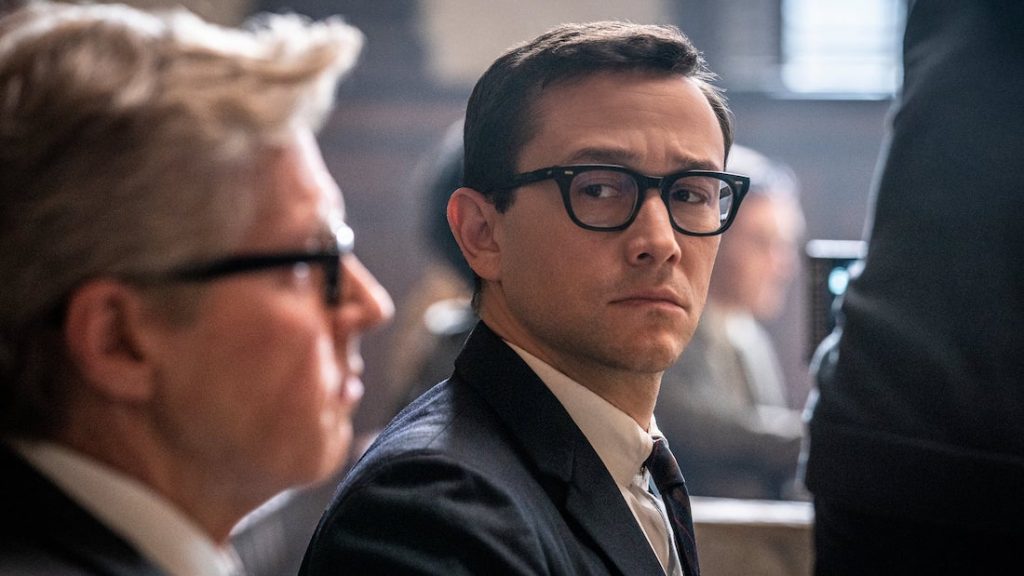
Baron Cohen’s Hoffman (as unlike Hayden as could be) takes the whole trial so flippantly one starts to wonder whether he’s acting dumb or really is that stupid, until his reluctant opening-up of a more serious side confirms that it’s the former. For much of the film, though, he forms a comedy double act with Strong’s Rubin.
Abdul-Mateen’s Seale, however, is rather overshadowed by Kelvin Harrison Jr. as Fred Hampton (another Panthers leader not on trial). Harrison conveys succinctly the Panthers’ impatience with peaceful protest when he speaks of Martin Luther King (“He has a dream. Well, now he has a fuckin’ bullet in his head”), but alongside him Abdul-Mateen often seems to have a more limited vision, to be primarily frustrated at the injustices done to him personally rather than angry at society in a broader way. This is a comment on the character as presented in the movie, of course, not the actual Bobby Seale.
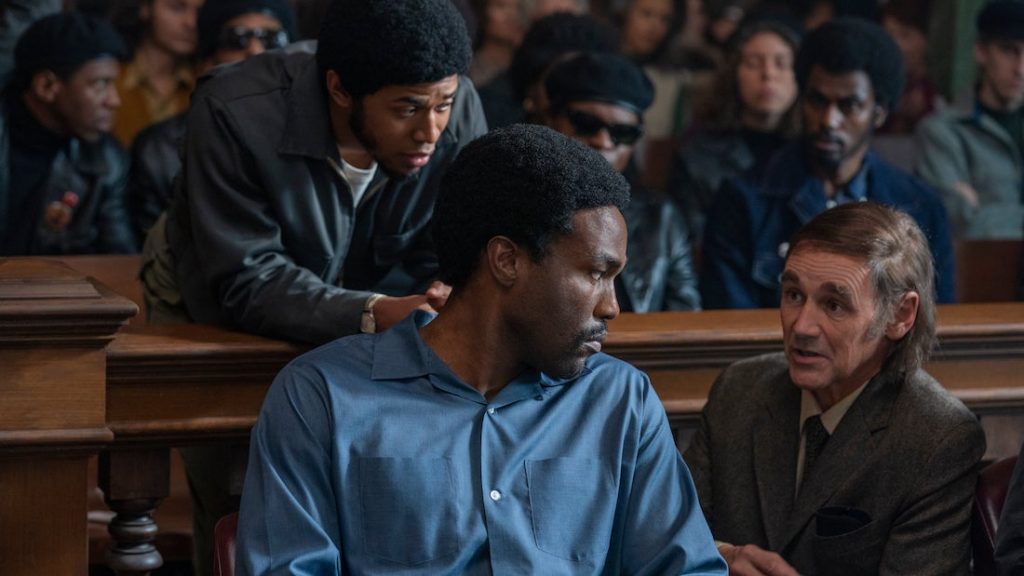
Less colourful, but in many respects subtler than all of them, is an outstanding Mark Rylance as William Kunstler, the lawyer for the seven. He’s convincingly weary and worldly-wise, a true believer in social justice but also more realistic than most of his clients. On the other side of the case, meanwhile, Joseph Gordon-Levitt is as good as always playing Richard Schultz, the young prosecutor, even if Sorkin resorts to some “honourable enemy” clichés in writing his role. He seems terribly buttoned-up at first, but gradually the man inside emerges, and an off-duty occasion where he runs into Rubin and Hoffman in a park is one of the best lower-key scenes.
John Doman as a domineering, vengeful John Mitchell (Nixon’s attorney general) and Michael Keaton as his predecessor are also plausible, as is Damian Young in a smaller part as a Justice Department functionary who seems to embody establishment anxiety about the protest movement. More memorable than any of these, however, is a superb Frank Langella as Judge Julius Hoffman (no relative of the Yippie defendant Abbie Hoffman, as he is at great pains to point out). It’s easy to imagine he must be an exaggerated caricature, given his blatant racism, prejudices, and his apparent confusion about the case he’s supposed to be hearing, but the real Hoffman seems to have been every bit as monstrous as Langella makes him!
The absence of important female roles is noticeable, yet of course it speaks volumes about the way not only the structures of power at the time, but also the supposedly freer-thinking or revolutionary groups, were still very male-led. And it doesn’t, in truth, harm the film. There’s enough variety amongst the men to keep things interesting. Indeed, one of the points The Trial of the Chicago 7 makes most successfully is that the antiwar and radical movements were far from homogenous, and (as we see with Hayden and Hoffman) frequently split by fierce disagreements.
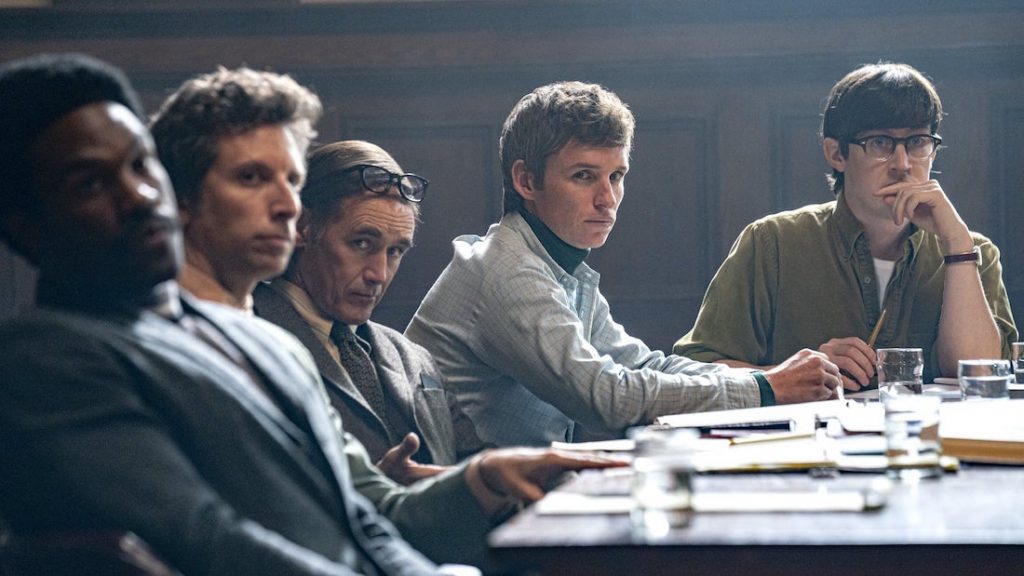
But given this, it’s a pity we’re never allowed to get close to the characters. We see what they do and we hear what they say, but it rarely feels like we know them. It’s perhaps only with Abbie Hoffman and the lawyer Kunstler that we get glimpses of an internal life. What really motivates Hayden, though, or Dellinger? The film offers no answers, and it’s particularly disappointing in the latter case, because John Carroll Lynch is such a terrific actor… but his role here is cryptic. The film provides nothing to understand him with: no idea whether he’s an ordinary guy with a family who just feels strongly about war, or whether he’s a constant activist on many issues, or whether his pacifism is religiously driven, for example.
There are some other minor flaws too. Sorkin’s direction can be unnecessarily smart aleck (for example when a sentence is started by one character in one scene, then finished by a second character in another scene). Daniel Pemberton’s score is also pedestrian and obvious. And there’s a sore thumb of a scene where Seale confronts Hayden and Kunstler, demanding of them: “Your life, it’s a fuck-you to your father, right? And you can see how that’s different from a rope on a tree?”
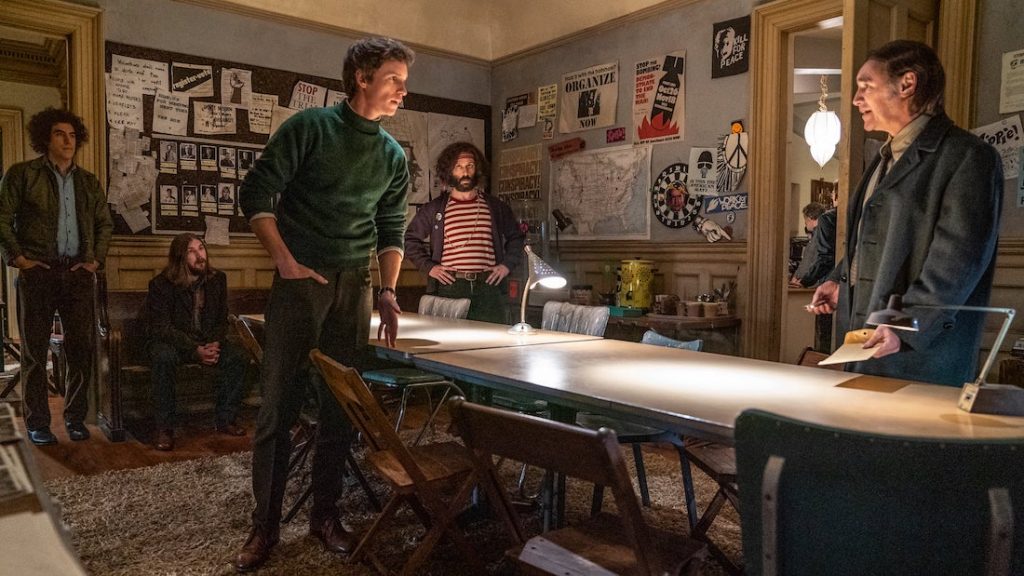
Here, the point may be a perfectly good one (undoubtedly quite a lot of 1960s protest was figuratively a fuck-you to fathers, and none of the white defendants would have been at risk of the same systemic injustices as Seale), but the line seems clumsily inserted to relate the events of 1968-1970 to the 2020 debate on white privilege. Certainly, both the historical trial itself and the film are about oppression in a broad sense, not just the narrow issue of anti-Vietnam protests, yet there might have been a less sloganeering way to get the idea across.
But in the end these are not big deals. What makes The Trial of the Chicago 7 an unsatisfying film is that we have little idea, beyond the bare facts, why anybody is doing the things they’re doing. Despite the cast’s creditable efforts, in most cases the impression is of actors representing people, rather than witnessing actual people.
There’s no ambiguity, no depth, no reason to care too much. Sorkin’s film tackles a historical event packed with intriguing individuals, taking place at a time of social upheaval with many resemblances to our own, and manages to make it simultaneously very entertaining and not especially interesting.
USA • UK • INDIA | 2020 | 129 MINUTES | 2.39:1 | COLOUR | ENGLISH

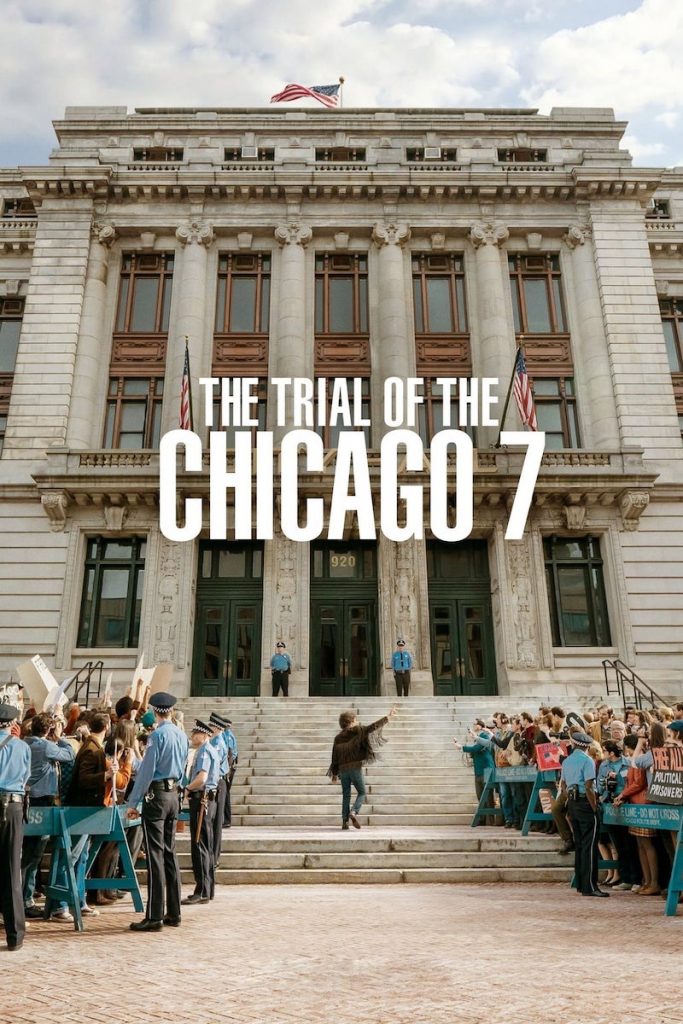
writer & director: Aaron Sorkin.
starring: Yahya Abdul-Mateen II, Sacha Baron Cohen, Daniel Flaherty, Joseph Gordon-Levitt, Michael Keaton, Frank Langella, John Carroll Lynch, Eddie Redmayne, Noah Robbins, Mark Rylance, Alex Sharp & Jeremy Strong.
